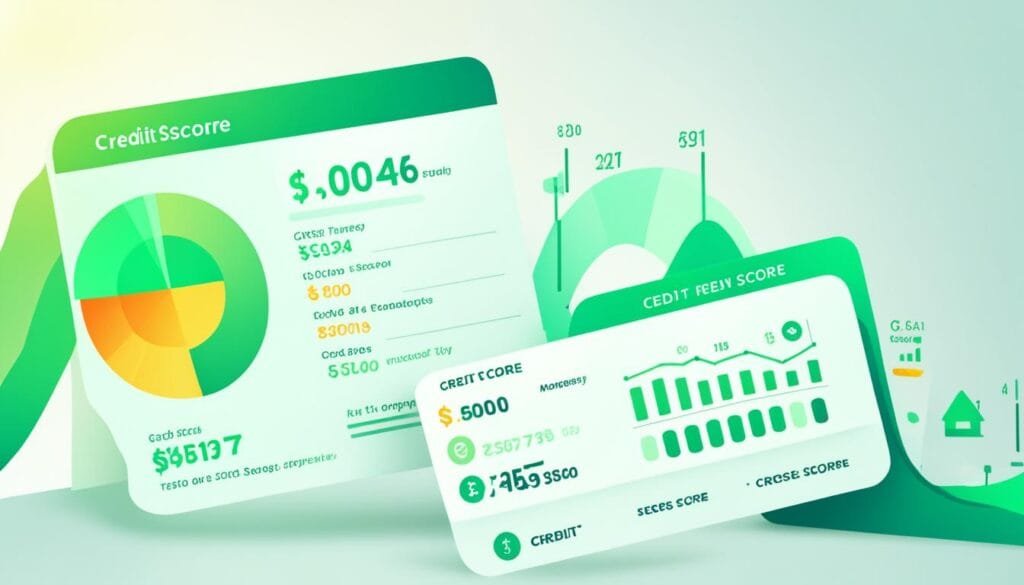Building credit from scratch can seem like a daunting task, but it is essential for financial success. Without a credit history, it can be difficult to secure loans, rent an apartment, or even get a job. This section will explore the importance of building credit and provide tips on how to establish a solid credit history.
Key Takeaways:
- Building credit is crucial for accessing financial opportunities.
- Establishing a solid credit history can help secure loans at favorable interest rates.
- Credit history is often considered by landlords and employers to assess reliability.
- Opening a credit card, becoming an authorized user, and reporting bill payments can help build credit.
- Credit builder loans are a great option for individuals starting from scratch.
Why Building Credit is Important
Building credit is a vital step in achieving financial success. It not only allows individuals to qualify for loans and secure favorable interest rates but also plays a crucial role in various aspects of life, including renting an apartment, buying a car, and even finding employment. Without an established credit history, individuals can be classified as “credit invisible,” which can limit their access to financial opportunities. To navigate the credit building process successfully, it’s essential to understand the significance of building credit and the strategies involved.
The Impact of Building Credit
Building credit offers a range of benefits and opportunities:
- Qualify for loans: A strong credit history improves an individual’s eligibility for mortgages, car loans, and other types of credit. Lenders use credit scores to assess the risk associated with lending money, and a higher credit score increases the chances of loan approval.
- Favorable interest rates: With a higher credit score, borrowers can secure loans at lower interest rates. This translates into significant savings over the life of the loan, making it easier to manage payments and reduce the overall cost.
- Showcase reliability: Landlords often check credit history when evaluating rental applications. A positive credit history demonstrates financial responsibility and reliability, increasing the chances of securing a desired rental property.
- Employment opportunities: Many employers review credit reports as part of their screening process. A strong credit history can contribute to a positive impression, showcasing responsible financial behavior and reliability.
Credit Building Strategies
Building credit involves adopting effective strategies to establish and improve credit history. Here are some essential credit building strategies:
- Establish credit with a credit card: Opening a credit card can be an excellent starting point for building credit. It’s important to use the card responsibly by making regular payments and keeping the balance low. This demonstrates financial discipline and helps establish a positive payment history.
- Consider secured credit cards: Secured credit cards are suitable for individuals with limited or no credit history. These cards require a security deposit, which serves as collateral. By using the secured credit card responsibly, individuals can build credit over time.
- Become an authorized user: Being added as an authorized user on someone else’s credit card can help individuals benefit from a positive credit history. It’s important to select a responsible primary cardholder and ensure that their credit behavior aligns with the goal of building credit.
- Report rental payments: Some credit bureaus offer services that allow individuals to report their rental payments, which can help build credit. Timely rental payments showcase payment consistency and financial responsibility.
“Building credit is a journey that requires patience and responsible financial habits. By utilizing the right strategies, individuals can gradually establish a solid credit history and unlock various opportunities.”
The Credit Building Process
Building credit is an ongoing process that requires dedication and consistent effort. Here’s a step-by-step guide to the credit building process:
- Check your credit report: Start by obtaining a copy of your credit report from each of the three major credit bureaus (Equifax, Experian, and TransUnion). Review the reports for any errors or discrepancies and dispute them if necessary.
- Establish credit: Open a credit card or consider other credit-building options, such as becoming an authorized user or reporting rental payments.
- Make timely payments: Consistently make payments on time to demonstrate responsible financial behavior. Late or missed payments can negatively impact credit scores.
- Monitor your credit: Regularly check your credit score and monitor your credit report for any changes. Stay updated on your credit utilization and address any issues promptly.
- Manage credit responsibly: Use credit responsibly by keeping balances low, avoiding excessive credit applications, and paying off debts gradually. Responsible credit management leads to a stronger credit profile over time.
By following these strategies and guidelines, individuals can embark on a successful credit building journey and pave the way for a brighter financial future.
How to Build Credit from Scratch
Building credit from scratch is a crucial step towards achieving financial stability and opening doors to various opportunities. While it may seem daunting for individuals with no credit history, there are several strategies that can be implemented to establish a solid credit foundation. This section will outline these methods in detail to help beginners build credit without credit history.
1. Open and Use a Credit Card Responsibly
One of the most common ways to start building credit is by opening and responsibly using a credit card. It’s important to choose a credit card that is suitable for beginners and ensures easy approval. Begin by making small purchases that can be easily paid off each month, and always make payments on time to demonstrate responsible credit usage. This way, individuals will gradually build a positive credit history, improving their credit score over time.
2. Consider Secured and College Credit Cards
For individuals with limited or no credit history, secured credit cards and college credit cards can be viable options. Secured credit cards require a security deposit that acts as collateral. By using a secured credit card and making timely payments, individuals can establish a positive credit history and eventually qualify for unsecured credit cards.
College credit cards, on the other hand, are specifically designed for students and can be a great way to start building credit. These cards often come with lower credit limits and fewer requirements, making them more accessible to those with limited credit history.
3. Become an Authorized User and Report Bill Payments
Another effective strategy for building credit is becoming an authorized user on someone else’s credit card account. This allows individuals to benefit from the primary cardholder’s positive credit history, as the account will appear on their credit report. It’s important to ensure that the primary cardholder has a strong credit history and makes timely payments for this method to be effective.
Additionally, individuals can report their bill payments to credit bureaus using services like Experian Boost. This enables individuals to include bill payments, such as rent and utilities, in their credit history, even if they don’t traditionally appear on credit reports.
“Building credit from scratch requires patience and responsible financial habits. By following these strategies, individuals can establish a strong credit foundation and improve their credit score over time.”
Table: Comparison of Credit Building Methods
| Methods | Pros | Cons |
|---|---|---|
| Opening and using a credit card | Opportunity to demonstrate responsible credit usage, gradual building of positive credit history | May require approval for beginners, potential for overspending if not used responsibly |
| Secured and college credit cards | Easier approval for individuals with limited credit history, opportunity to build credit gradually | Secured cards require a security deposit, college cards may have higher interest rates |
| Becoming an authorized user and reporting bill payments | Benefit from someone else’s positive credit history, inclusion of bill payments in credit report | Relies on primary cardholder’s responsible credit behavior, limited impact if no bill payments to report |
Consider Credit Builder Loans
Credit builder loans are a valuable tool for individuals looking to build their credit history. These loans are specifically designed to help people establish or improve their credit scores, making them a great option for those starting from scratch.
One of the main advantages of credit builder loans is that they require a security deposit. This deposit is held in a locked account, ensuring that the lender has collateral in case the borrower defaults on the loan. As the borrower makes regular payments on the loan, their credit history begins to improve, ultimately leading to a higher credit score.
Obtaining a credit builder loan is relatively easy, as they are offered by many smaller banks and credit unions. These institutions specialize in helping individuals in the early stages of credit building, making them a more accessible option than traditional lenders. By securing a credit builder loan, borrowers can demonstrate their responsible financial behavior and improve their chances of accessing future credit opportunities.
Here are the steps to secure a credit builder loan:
- Research lenders: Start by researching smaller banks and credit unions that offer credit builder loans. Look for institutions that have a good reputation and favorable terms.
- Review eligibility criteria: Each lender may have different eligibility criteria for credit builder loans. Review the requirements thoroughly to ensure you meet them before applying.
- Gather necessary documents: Prepare the documents you’ll need to apply for a credit builder loan. This may include proof of income, identity verification, and a valid bank account.
- Submit your application: Once you have all the necessary documents, submit your application to the lender. Follow their instructions carefully and provide accurate information.
- Wait for approval: The lender will review your application and make a decision. If approved, they will provide you with the loan details and repayment terms.
- Make timely payments: Once you have the loan, it’s crucial to make regular, on-time payments. This will demonstrate your financial responsibility and build your credit history.
- Monitor your progress: Keep track of your credit score and credit report to see the positive impact of your credit builder loan. Monitor for any errors or discrepancies and address them promptly.
- Complete the loan term: Finally, complete the full term of the credit builder loan. As you make consistent payments, the funds in the locked account will become available to you, providing an added financial benefit.
By following these steps and committing to responsible financial habits, individuals can successfully build their credit history with the help of credit builder loans. It’s important to remember that credit building takes time, so patience and consistency are key.

Tips for Improving Credit Score
Improving your credit score is a critical step in building a strong credit history. A higher credit score not only opens doors to better financial opportunities but also demonstrates your creditworthiness to lenders and landlords. Here are some valuable tips and strategies to help you improve your credit score:
1. Make Regular Payments on Time
An essential factor influencing your credit score is your payment history. It’s crucial to make timely payments on all your bills, loans, and credit cards. Late or missed payments can have a significant negative impact on your credit score. Set up reminders or automatic payments to ensure you never miss a due date.
2. Keep Credit Utilization Low
Credit utilization refers to the percentage of your available credit that you’re using. Keeping this ratio low can positively impact your credit score. Aim to use only a small portion of your available credit, ideally below 30%. High credit utilization can indicate financial instability or excessive reliance on credit, which may negatively affect your creditworthiness.
3. Be Selective When Applying for Credit
While it’s important to build a diverse credit portfolio, it’s also crucial to be selective when applying for new credit accounts. Multiple inquiries on your credit report within a short period can raise red flags to lenders. Each application generates a hard inquiry, which potentially lowers your credit score. Before applying, research the requirements and assess your likelihood of approval to avoid unnecessary rejections.
4. Review and Dispute Errors on Your Credit Report
Regularly reviewing your credit report allows you to identify and dispute any errors or inaccuracies that may be negatively affecting your credit score. Credit reporting agencies are required by law to provide one free credit report per year, which you can obtain from AnnualCreditReport.com. Carefully examine the report for any incorrect information, such as unauthorized accounts or incorrect payment statuses, and file a dispute with the credit bureau to have them corrected.
Quote: “Improving your credit score requires proactive efforts and responsible financial habits.”
By implementing these tips and taking a proactive approach, you can gradually improve your credit score. It’s important to remember that building credit takes time and patience. Consistently practicing good credit behavior and maintaining healthy financial habits will contribute to a stronger credit profile and open doors to better financial opportunities.

| Credit Score Range | Rating |
|---|---|
| 800 – 850 | Exceptional |
| 740 – 799 | Very Good |
| 670 – 739 | Good |
| 580 – 669 | Fair |
| 300 – 579 | Poor |
Are the Tips for Building Credit from Scratch Different from Effective Credit Score Building Strategies?
Building credit from scratch requires different tips than using effective credit score building strategies. While the former may involve starting with secured credit cards or credit-builder loans, the latter focuses on maintaining low credit utilization and making timely payments to boost credit scores. Both are essential for establishing a good credit history.
Conclusion
Building credit from scratch is a crucial step towards financial success. By following these tips and strategies, individuals can establish a solid credit history and create opportunities for themselves. It’s important to remember that building credit takes time and patience. Results may not be immediate, but with perseverance and responsible financial habits, anyone can build credit from scratch and pave the way for a solid financial future.
To start building credit, consider opening a credit card and using it responsibly. Make regular payments on time and keep your credit utilization low. Becoming an authorized user on someone else’s account or reporting bill payments can also help. In addition, credit builder loans are a great option for establishing credit. These loans provide an opportunity to demonstrate responsible financial habits and build credit.
Remember to review your credit reports regularly and dispute any errors you find. Improving your credit score is an important part of the credit-building process. Paying bills on time and being selective when applying for loans or credit cards can help boost your score. With dedication and the right strategies, you can build credit from scratch and set yourself up for a brighter financial future.
FAQ
How can I start building credit from scratch?
Building credit from scratch can be achieved through various methods, such as opening and using a credit card responsibly, becoming an authorized user on someone else’s account, or reporting bill payments. Check out the “How to Build Credit from Scratch” section for more detailed strategies.
Why is building credit important?
Building credit is important because it allows individuals to qualify for loans at favorable interest rates, showcases reliability to landlords and employers, and helps access financial opportunities. Learn more about the significance of building credit in the “Why Building Credit is Important” section.
Can I build credit without a credit history?
Yes, it is possible to build credit without a credit history. Strategies such as becoming an authorized user on someone else’s account, reporting bill payments, or obtaining credit builder loans can help establish credit. Find out more in the “How to Build Credit from Scratch” section.
What are credit builder loans and how can they help me build credit?
Credit builder loans are specifically designed to assist individuals in building credit. These loans require a security deposit, and regular payments are made on the loan. Once the full amount is paid, the funds are released, and the individual’s credit history reflects responsible financial habits. Check out the “Consider Credit Builder Loans” section for more details.
How can I improve my credit score?
Improving credit score can be done by making regular payments on time, keeping credit utilization low, and reviewing credit reports regularly for errors. The “Tips for Improving Credit Score” section provides helpful strategies for boosting your credit score.
Is building credit from scratch a long process?
Building credit from scratch takes time and patience. It’s important to practice responsible financial habits, make timely payments, and gradually build credit history. By following the tips and strategies outlined in this guide, individuals can establish a strong credit foundation for a solid financial future.

